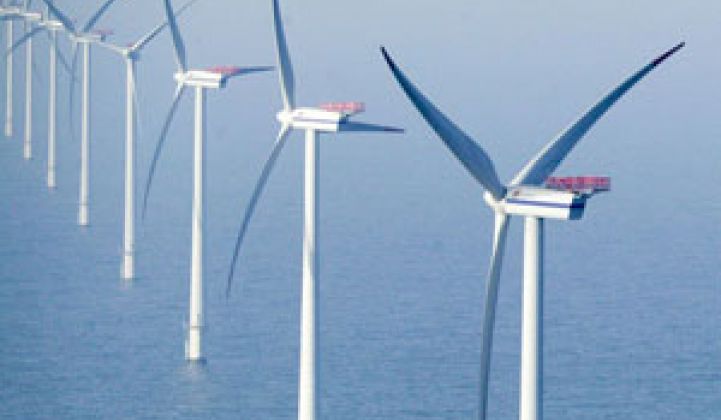Abu Dhabi's alternative-energy investment fund, Masdar, said Thursday it has taken a 20 percent stake in a massive offshore wind farm project to be built in the United Kingdom.
Called the London Array, the project calls for up to 271 wind turbines to be erected east of London in the outer Thames Estuary. The project will have 1 gigawatt of capacity.
Masdar gained its stake in the project through a joint venture with German utility company E.ON, which owns half of the project. The deal calls for E.ON to handover 40 if its shares to Masdar. The two companies did not disclose how much Masdar paid for the stake.
The Danish energy company DONG Energy owns the other half of the project.
The move by Masdar will provide assurance to the offshore wind farm project, which found itself on shaky ground earlier this year when oil giant Royal Dutch Shell backed out as an investor.
Previously, E.ON, DONG Energy and Royal Dutch Shell held equal stakes in the project.
In April, the Financial Times broke the story that Shell was looking to sell its stake but didn't explain why. As a result concerns erupted over how Shell's decision would impact the project and the ability for the United Kingdom to reach its renewable energy goals.
By July, E.ON and DONG Energy said they were buying out Shell's stake in the wind farm for an undisclosed sum.
Offshore wind farms are expensive. In July, New Energy Finance pegged the cost of the London Array project at £1.5 billion ($2 billion).
Having a wealthy partner like Masdar will not only spread the financial burden but also some of the risks.
Offshore wind power is still in its infancy when compared to onshore wind power. Out of the more than 94 gigawatts of wind-generating capacity that was in operation at the end of 2007, only 1.1 gigawatts of those were offshore, according to the American Wind Energy Association.
Europe is currently the only region in the world that has offshore wind power. However, other countries like the United States are looking to change that. For example, renewable-project developer Principle Power told Greentech Media earlier this month that the firm is pushing ahead with its first project: a 150-megawatt offshore wind park off the coast of Oregon (see Blowing Offshore Power Into Oregon).
"We believe that the offshore wind market will be a major force in the future and this is a very opportune time for us to enter this developing segment of the renewable energy market," said Dr. Sultan Al Jaber, CEO of Masdar.
Offshore wind farms offer advantages that landlocked wind parks don't have, including stronger and steadier winds to generate electricity consistently and reduce turbine wear and tear.
This is not the first time Masdar has bet on the wind industry. Last month, Masdar made a €120 (about $161 million) investment in the Finnish wind-turbine manufacturer WinWinD.
Also making a play in the wind industry is South Korea-based Hyundai Heavy Industries Co. The industrial construction company, whose business includes building power plants and ships, said Thursday it licensed two wind turbine designs with 1.65 megawatts and the 2 megawatts in capacity, from American Superconductor Corp. (NSDQ: AMSC).
Hyundai plans to start production of the 1.65-megawatt wind turbine by the end of the year and will initially sell the turbine in the United States.
American Superconductor's stock increased $1.87, or 14.36 percent, to $14.89 per share during late day trading.



